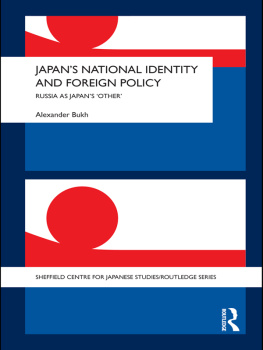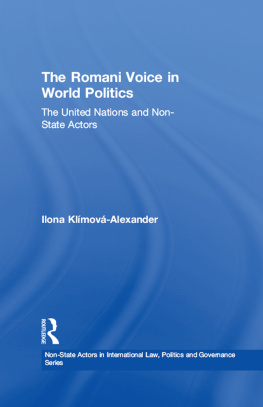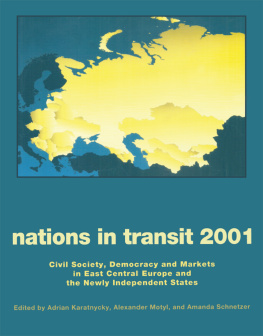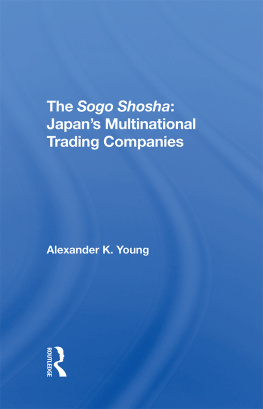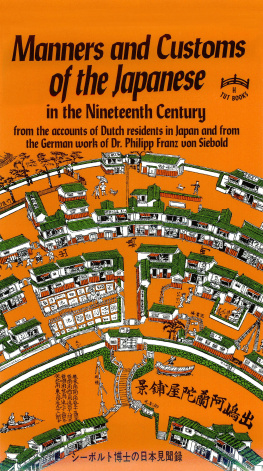ROUTLEDGE LIBRARY EDITIONS: JAPAN
JAPANS ACCESSION TO THE COMITY OF NATIONS
JAPANS ACCESSION TO THE COMITY OF NATIONS
ALEXANDER VON SIEBOLD
Translated from the German with an introduction by CHARLES LOWE
Volume 47

LONDON AND NEWYORK
First published in 1901
This edition first published in 2011
by Routledge
2 Park Square, Milton Park, Abingdon, Oxon, OX14 4RN
Simultaneously published in the USA and Canada
by Routledge
270 Madison Avenue, New York, NY 10016
Routledge is an imprint of the Taylor & Francis Group, an informa business
This edition published in the Taylor & Francis e-Library, 2010.
To purchase your own copy of this or any of Taylor & Francis or Routledges collection of thousands of eBooks please go to www.eBookstore.tandf.co.uk.
1901 Kegan Paul, Trench, Trbner & Co. Ltd
All rights reserved. No part of this book may be reprinted or reproduced or
utilised in any form or by any electronic, mechanical, or other means, now
known or hereafter invented, including photocopying and recording, or in any
information storage or retrieval system, without permission in writing from the
publishers.
British Library Cataloguing in Publication Data
A catalogue record for this book is available from the British Library
ISBN 0-203-84504-8 Master e-book ISBN
ISBN 13: 978-0-415-56498-4 (Set)
eISBN 13: 978-0-203-84317-8 (Set)
ISBN 13: 978-0-415-58780-8 (Volume 47)
eISBN 13: 978-0-203-84504-2 (Volume 47)
Publishers Note
The publisher has gone to great lengths to ensure the quality of this reprint but
points out that some imperfections in the original copies may be apparent.
Disclaimer
The publisher has made every effort to trace copyright holders and would
welcome correspondence from those they have been unable to trace.
JAPANS ACCESSION TO THE COMITY OF NATIONS
BY
BARON ALEXANDER VON SIEBOLD
TRANSLATED FROM THE GERMAN WITH AN INTRODUCTION BY
CHARLES LOWE, M.A.
AUTHOR OF PRINCE BISMARK: AN HISTORICAL BIOGRAPHY, ALEXANDER III. OF RUSSIA, THE GERMAN EMPEROR, WILLIAM II., KING EDWARD VII., ETC. ETC.
LONDON
KEGAN PAUL, TRENCH, TRBNER & CO. L TD
PATERNOSTER HOUSE, CHARING CROSS ROAD
1901
This edition published in the Taylor & Francis e-Library, 2010.
To purchase your own copy of this or any of Taylor & Francis or Routledges collection of thousands of eBooks please go to www.eBookstore.tandf.co.uk.
The rights of translation and of reproduction are reserved
ISBN 0-203-84504-8 Master e-book ISBN
AUTHORS PREFACE
THE substance of this little work on the entry of Japan into the comity of European nations has already appeared in the form of a series of articles in the magazine Ost-Asien; and the author thought it right to revise and republish them as a whole, in view of the fact that the opening up of the Japanese Empire had, in the meantime, attracted universal attention to his subject.
The following narrative is based on personal observations and recollections extending over six different periods of residence in Japan, between the years 1859 and 1887, but not on official Japanese sources of information, which, unfortunately, have not yet been rendered accessible. The work of a prominent German labourer in the same field, Japans Volkswirthschaft und Staatshaushalt (The Political Economy and Finances of Japan), by Karl Rathgen, has served him as guide and furnished him with some of his statistical matter, while recent English Blue-books provided valuable material for his account of the latest diplomatic negotiations.
Defective and unsatisfying as such an attempt to sketch the history of reform in Japan must necessarily be, the writer nevertheless thought it incumbent on him not to shirk the task, seeing that, having lived so long in the Far East as an eye-witness of the events recorded, and as an occasional assistant of their authors, he felt particularly called upon to contribute to an appreciation of the magnificent achievements of the statesmen and diplomatists of the Meiji Era who have laid the foundation-stone of Japans enlightenment and international equality.
CHTEAU LEIPHEIM
(On the Danube)
December 1899.
TRANSLATORS INTRODUCTION
THE recent course of events in the Far East has once more attracted the attention of the West to that remarkable Power which, as it brought China to her knees in 1894, has again been foremost in the ranks of the nations that allied themselves for the purpose of calling the Celestial Empire to account for the outrages perpetrated by its Government and people on what may be called the rights of civilisation. In the advance on Pekin to rescue the Legations of the Powers from a fate worse than that of another Cawnpore, the troops of Japan formed the strongest and most efficient contingent of the Allied Army; and, indeed, it may be said that, but for the general assistance rendered by the Imperial Government at Tokio throughout the whole crisis, the cause of the West would not have been so quickly or so completely vindicated.
This was altogether a new phenomenon in the history of the worldthis championing of the cause of civilisation by a Far Eastern Power like Japan, which, until a year or two ago, had not been thought worthy of the rights and privileges enjoyed by the nations of Europe in their intercourse with one another. What was the explanation of this change, this very sudden change? What is the secret of the fact that, for the last seven years at least, the attention of Englishmen in particular has been riveted on Japan much in the same way as it was concentrated on Germany after it had been regenerated by a policy of blood and iron riveted on Japan, I say, as on a country which had suddenly assumed the form of a new and dominant force in the political arena of the Far East?
The explanation of all this is very simple. What Germany had become in Europe through a policy of blood and iron, Japan had attained to in the Far East by adopting the civilisation of the West, as one would exchange a medival mantle for a modern coat. While China still obstinately and suicidally clung to her Confucianistn, with all that this imports, Japan made haste to assimilate the ideas of the Occident, with the result, among other things, that the Celestial Empire went down before her touch like crumbled clay. In the year 1868 Japan was still pretty much the Japan of old; but by 1900 she had sprung into line, almost as if at a single bound, with the most highly civilised nations of the world. The former was the year of her so-called Restoration, when the Shogunate, or Major-domo despotism of the land, had been replaced by the old Imperial power; and within about thirty years of that time Japan had been fully admitted into the fellowship of European nations as a civilised and a constitutional Statehundreds of years ahead of China.
Nothing so rapid or complete in the shape of national transformation is recorded in the history of the world, and therefore this little work of my friend, Baron Alexander von Siebold, must have a very special interest for English readers. The Baron has the double qualification of family inheritance and personal experience for the interesting and instructive story which he tells us. A son of the celebrated German scientist and Eastern pioneer, Philip Francis von Sieboldwho may be said to have been mainly instrumental in rendering Japan accessible to the ideas of the West, as witness his elaborate work, Nippon, on the subjectBaron Alexander, when only in his thirteenth year, accompanied his father to that country, of which he was quick to master the language.





